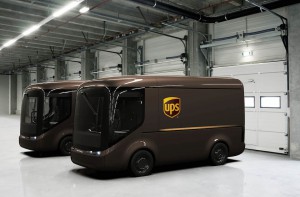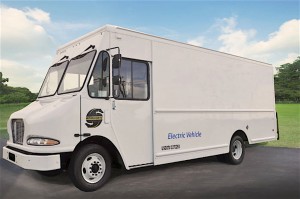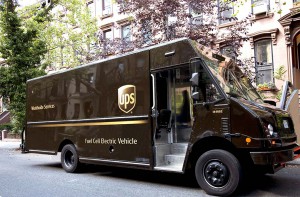
UPS is working with UK tech firm Arrival on the development of new battery-electric delivery vans for Europe.
UPS has announced that it is working with UK-based technology firm Arrival to develop a pilot fleet of 35 electric delivery vehicles that will be tested in London and Paris.
Both cities are moving towards tighter restrictions on vehicles with internal combustion engines and zero tailpipe emission, lightweight composite vehicles have a battery range of more than 150 miles.
The range is considerably better higher than other EVs currently in service, UPS officials said.
“UPS is working with Arrival here in the UK because their smart electric vehicles are helping to reduce dependency on fossil fuel. This is a pioneering collaboration that helps UPS develop new ways to reduce our emissions,” said Luke Wake, international director for automotive engineering in the advanced technology group at UPS.
(UPS orders 50 battery-electric delivery vans from Workhorse. Click Here for the story.)

UPS ordered 50 battery-electric vans from Workhorse Group. The company has 35,000 trucks that could be replaced in the years ahead in the U.S.
“UPS is marshaling its global scale to encourage innovation within the automotive industry. We are helping to drive demand for these disruptive technologies. The result is a safer and cleaner fleet for the communities in which we deliver,” he said.
The vehicles will also come equipped with Advanced Driver Assistance Systems (ADAS) that help to improve safety and reduce driver fatigue. These features, combined with a highly advanced vehicle display provide the driver with an intelligent and connected vehicle, Wake said.
Arrival is the first commercial vehicle manufacturer in Europe to provide purpose-built electric delivery vehicles to UPS’s specifications. Since 2016, UPS and Arrival have been developing prototypes of different sizes, and the first vehicles are expected to be deployed on the road before the end of this year.
“We’re excited to collaborate with UPS to create an affordable, modular, fully electric delivery vehicle designed to make deliveries in our busy cities clean and quiet,” said Denis Sverdlov, Arrival CEO said.
“With its unique, wrap-around front window the driver has a much wider field of view that improves not only the safety of the driver but also that of cyclists and pedestrians,” he said.
(Click Here for details about UPS ordering trucks from Tesla.)

UPS has been experimenting with a variety of different powertrain alternatives, and is putting more on the street.
Electromobility and alternative technology vehicles are a priority for UPS. With more than 9,000 vehicles worldwide operating using alternative propulsion methods, UPS possesses one of the largest private and most diverse alternative fuel and advanced technology fleets in the entire logistics industry.
Since 2009, UPS has invested over $750 million in alternative fuel and advanced technology vehicles. And, in 2016, a full year earlier than expected, UPS achieved its self-set goal of covering 1 billion miles using its fleet of alternative fuel and advanced technology vehicles.
“This initiative will help UPS attain its global carbon reduction goals for the company’s facilities and fleets,” said Peter Harris, director for sustainability at UPS Europe. “We will continue working with our partners, communities and customers to spark innovation, thus leading the industry toward a more sustainable future.”
UPS has a long history with electric vehicles, having first introduced them into its fleet in the U.S. in the 1930s, and reintroduced modern EVs in 2001. Currently, UPS has more than 300 electric vehicles deployed in Europe and the U.S., and nearly 700 hybrid electric vehicles.
Last December, UPS ordered 125 new fully-electric semi-tractors to be built by Tesla in 2019, the largest pre-order to date. Additionally, last September, UPS announced it will become the first commercial customer in the U.S. to start using three medium-duty electric trucks from Daimler Trucks Fuso brand, called the eCanter.
More recently, UPS said it plans to deploy 50 plug-in electric delivery trucks that will be comparable in acquisition cost to conventional-fueled trucks – an industry first that is breaking a key barrier to large-scale fleet adoption.
(To see more about UPS first-ever fuel cell trucks, Click Here.)
The company also is collaborating with Workhorse Group Inc. to design the vehicles from the ground up, with zero tailpipe emissions.
